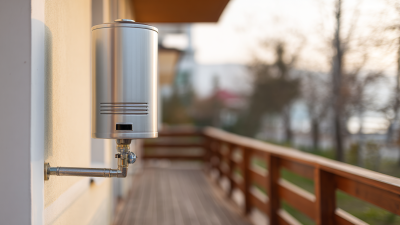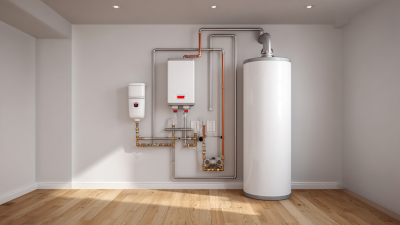
When it comes to outdoor adventures, camping trips, or emergency preparedness, a Portable Water Heater has become an essential tool for many households. According to the latest market research report by Research and Markets, the portable water heater market is projected to grow at a CAGR of 7.5% over the next five years, highlighting the increasing demand for this convenient solution. With various types available, from tankless models to solar-powered options, the benefits of selecting the right portable water heater can significantly enhance your experience. Not only do these devices provide instant hot water, but they also promote energy efficiency and portability, making them an ideal choice for those who enjoy outdoor activities or simply need backup hot water sources. This guide will explore the key benefits of different types of portable water heaters, helping you make an informed decision tailored to your specific needs.

When choosing the best portable water heater, understanding your hot water needs is essential. Factors such as usage frequency, temperature requirements, and the number of people relying on hot water can greatly influence your decision. According to a report by the American Council for an Energy-Efficient Economy, residential water heating accounts for approximately 18% of energy use in a typical home, making it crucial to select an efficient model that aligns with your lifestyle.
Tips: Consider the flow rate of the portable water heater. For example, if you are planning to wash dishes, take a shower, and do laundry simultaneously, a unit with a higher flow rate—around 3 to 5 gallons per minute—will ensure a steady supply of hot water without interruptions.
Moreover, assess the heater's energy source. Options include electric, propane, or natural gas units, each offering distinct advantages. The U.S. Department of Energy reports that electric water heaters usually have lower upfront costs but may result in higher operational expenses over time. As such, it's wise to factor in both initial and long-term costs to determine the most suitable option for your needs.
Tips: Look for models with an Energy Star rating to ensure efficiency and potential savings on utility bills, as these units are often designed to use less energy while providing adequate hot water output.
This chart represents the various types of portable water heaters based on their capacity measured in gallons per minute (GPM). This helps in understanding which type of water heater may be suitable for different hot water needs.
When selecting a portable water heater, understanding the various types available is essential to meet your specific needs. The most common types include tankless water heaters, which provide an endless supply of hot water on demand, and traditional tank heaters, which store a certain volume of hot water for use. According to a report from the U.S. Department of Energy, tankless heaters can be up to 34% more energy-efficient than conventional tank systems, especially for homes that use less than 41 gallons of hot water daily.
Another popular option is propane water heaters, favored for their portability and ability to deliver hot water quickly when needed, making them ideal for camping or outdoor events. Data from the National Association of Home Builders indicates that nearly 25% of new homes are now equipped with tankless systems, highlighting the growing preference for efficient and space-saving solutions. Ultimately, selecting the right type of portable water heater depends on your hot water demand, energy efficiency needs, and portability requirements, ensuring you not only keep warm but also conserve energy.
When selecting a portable water heater, certain essential features can significantly enhance your overall experience. First and foremost, consider the power source. Many portable water heaters operate on propane or electricity. If you frequently camp or travel to remote locations, a propane model might be more convenient, whereas electric heaters are ideal for use in areas with power access. Additionally, check the heater's BTU (British Thermal Units) rating, as this indicates the heating power; higher BTUs generally mean faster heating times.

Another critical feature to evaluate is the heater's capacity. Depending on your needs—whether you’re showering, washing dishes, or filling a hot tub—selecting a unit with adequate water capacity is essential. Look for models that provide quick recovery rates, so you can have continuous hot water without significant downtime. Lastly, consider the portability aspects, such as weight and design. A compact and lightweight heater will be easier to transport, while a durable design ensures it can withstand the rigors of travel. By focusing on these key features, you can find a portable water heater that perfectly fits your unique requirements.
When using portable water heaters, safety should always be a top priority. First and foremost, always read the manufacturer’s instructions thoroughly before operation. Understanding the specific features and settings of your water heater can prevent accidents and ensure efficient usage. Additionally, ensure your portable heater is placed on a stable, level surface to prevent tipping or spilling hot water, which can lead to burns or other injuries.
Another key safety tip is to monitor the water temperature regularly. Many models come with built-in temperature regulation, but it is prudent to check the heat setting manually as well. If the heater lacks an automatic shut-off feature, be sure to set a timer or periodically check to avoid overheating. Finally, avoid using portable water heaters in confined spaces or areas with poor ventilation, as this may lead to dangerous levels of carbon monoxide accumulation. Following these guidelines can help you enjoy the convenience of portable water heaters while minimizing risks.
| Feature | Description | Safety Tips |
|---|---|---|
| Heating Capacity | Choose based on the number of people and usage frequency. | Ensure the unit has an automatic shut-off feature. |
| Portability | Look for lightweight models with comfortable handles. | Secure the heater during transport to avoid damage. |
| Energy Source | Select between propane, electric, or solar based on availability. | Keep fuel sources in a cool, ventilated area. |
| Temperature Control | Look for options with adjustable temperature settings. | Always test temperature before use on skin. |
| Durability | Opt for models made from corrosion-resistant materials. | Regularly inspect for wear and tear before use. |
 Proper maintenance and care are essential for extending the life of your portable water heater. Regularly inspecting your unit for wear and tear can help identify potential issues before they escalate. Start by checking for leaks or any signs of corrosion, particularly around the connections and seals. It's also important to keep the unit clean, as sediment buildup can affect performance and efficiency. Regularly flushing the tank and cleaning the filters will prevent clogs and ensure a consistent flow of hot water.
Proper maintenance and care are essential for extending the life of your portable water heater. Regularly inspecting your unit for wear and tear can help identify potential issues before they escalate. Start by checking for leaks or any signs of corrosion, particularly around the connections and seals. It's also important to keep the unit clean, as sediment buildup can affect performance and efficiency. Regularly flushing the tank and cleaning the filters will prevent clogs and ensure a consistent flow of hot water.
In addition to routine maintenance, the way you use your portable water heater plays a critical role in its longevity. Avoid running the heater at maximum capacity for extended periods, as this can overwork the system and lead to premature failure. Instead, allow the unit to rest and cool down between uses. Furthermore, when not in use, store the heater in a dry place to protect it from moisture, which can cause rust and damage. By implementing these practices, you’ll not only prolong the lifespan of your portable water heater but also enhance its performance and reliability.





